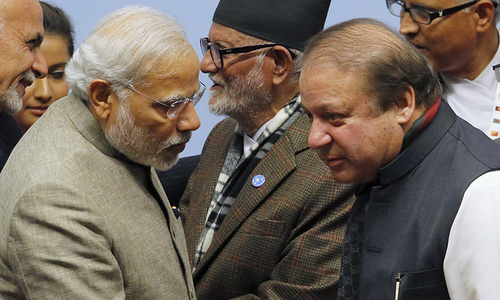India rows back to discuss Kashmir in surprise NSA talks

THE national security advisers of Pakistan and India met for a brief and unannounced meeting in Bangkok on Sunday and a joint statement they issued shows New Delhi rowing back from its recent position and agreeing to discuss Jammu and Kashmir in the otherwise familiar mix of issues.
The ‘candid and cordial’ meeting between Pakistan’s recently appointed NSA retired Lt Gen Nasser Khan Janjua and his Indian counterpart Ajit Doval is being seen by political pundits as a ‘side effect’ of the Bihar elections in which Prime Minister Narendra Modi’s BJP was humiliated.
However, according to knowledgeable circles, a meeting in Paris between Prime Minister Nawaz Sharif and PM Modi on the sidelines of the Climate Change Summit broke the ice. Britain and the United States are said to have nudged the two leaders to make a fresh attempt by restarting their dialogue on outstanding disputes.
The Bangkok talks fanned speculation that Indian Foreign Minister Sushma Swaraj could be in Islamabad on Tuesday albeit in the cover of an Afghanistan-related conference.
But only a team of diplomats led by Foreign Secretary S. Jaishankar had been given visas till Sunday.
Sources close to the talks in Bangkok said chances of Ms Swaraj’s visit were “bright”.
The Indian media expectedly underscored terrorism as the main thrust of the Bangkok talks.
The foreign secretaries of the two countries, due to meet in Islamabad, also attended the Bangkok talks. The meeting was otherwise notably headed for India by a former police officer and for Pakistan by a former army officer.
Analysts saw the involvement of Lt Gen Janjua as a significant pointer that the military was keen to steer Pakistan’s India policy.
The joint statement was brief. It said: “Pursuant to the meetings of the prime ministers of India and Pakistan in Paris, the national security advisers, accompanied by the foreign secretaries, met in Bangkok today.
“Discussions were held in a candid, cordial and constructive atmosphere.
“They were guided by the vision of the two leaders for a peaceful, stable and prosperous South Asia.
“Discussions covered peace and security, terrorism, Jammu and Kashmir, and other issues, including tranquillity along the LoC.
“It was agreed to carry forward the constructive engagement.”
Who would carry forward the constructive engagement? That was not clear, setting off curious surmises. Allowing Ms Swaraj to head future talks would involve the external affairs bureaucracy, which is not Mr Modi’s preferred method of working.
On the other hand, the Indian minister can by protocol only interact with Foreign Affairs Adviser Sartaj Aziz, a scenario that could dampen Lt Gen Janjua’s recent appointment as the implied point person for big-ticket India parleys. Officially, Ms Swaraj will be visiting Islamabad to attend a meeting of the ‘Heart of Asia’ process on Tuesday and Wednesday.
There are reasons why Ms Swaraj’s chances of visiting Islamabad are brighter than some other minister being assigned the job. The Afghanistan-related ‘Heart of Asia’ is expected to be attended by representatives from Azerbaijan, China, Iran, Kazakhstan, Kyrgyzstan, Russia, Saudi Arabia, Tajikistan, Turkey, Turkmenistan and the UAE.
There seems to be no choice for India but to send her for the conference involving high-level interactions. So far, according to diplomatic sources, the foreign ministers who have signalled their participation belong to Iran, Turkey, China, Kyrgyzstan and Sweden. Russia and the United States are also expected to be present at a visible level in the heart of the discussions, which are of just as much interest to India, if not more.
Afghan President Ashraf Ghani’s presence is an obvious attraction.
The Pakistan-India talks remained suspended since Jan 2014 because of violations of ceasefire on the Line of Control. Bilateral ties have mostly remained frosty since the BJP came to power last year.
The two prime ministers took a number of initiatives, including a visit by Mr Sharif to Delhi for Mr Modi’s inauguration in May 2014, a secret meeting between the two in Kathmandu on the sidelines of the Saarc summit in Nov 2014, an interaction in Ufa (Russia) on the margins of the Shanghai Cooperation Organisation summit in July this year and most lately in Paris.
Additionally, the two leaders have on a few occasions, during this period, had telephonic conversations and exchanged letters. But all these engagements prior to Paris failed to achieve sustained progress towards normalisation of ties.
Mr Sharif and Mr Modi had in Ufa agreed on a meeting of their NSAs for discussing terrorism threats, but it could not take place because of differences over agenda and Pakistan’s insistence on a meeting with the Kashmiri leadership.
The Paris meeting in a way found a way of getting past the impasse that led to the cancellation of the NSA-level talks previously scheduled for Aug 23 by settling for a neutral venue and including Kashmir dispute in the agenda.
The two countries, according to a source, initially planned to meet in Singapore, but later the venue was changed to Bangkok.
Notwithstanding media excitement over the meeting, in private conversation diplomats in Islamabad looked extremely cautious about any breakthrough.
A senior Pakistani official, who had been briefed on the Bangkok meeting, described in a conversation with Dawn the process started after the Paris meeting of the two prime ministers only as “talks for talks”.
“Modi government is still not ready to return to Composite Dialogue. At these meetings our discussions are about a mutually agreed dialogue framework. Let’s see how things evolve in weeks ahead,” the official maintained. Another diplomat, while talking to Dawn, too looked circumspect about the engagement producing any result.
Published in Dawn, December 7th, 2015

















































